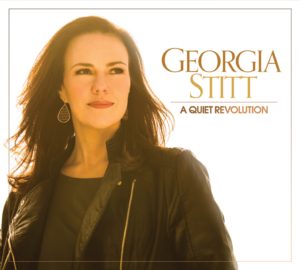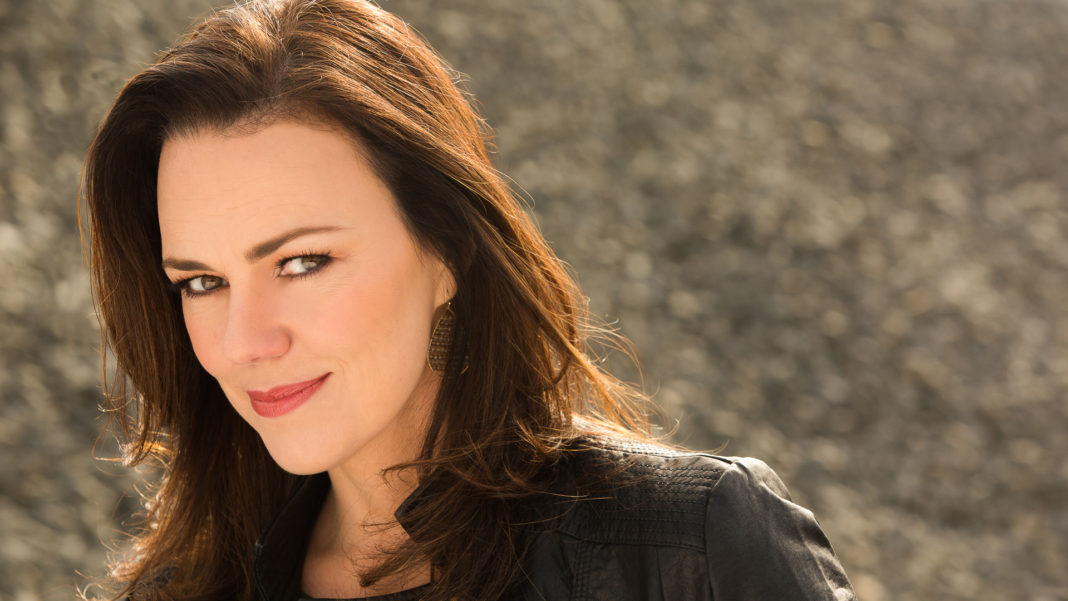“I think with all art and music we hear it in the perspective of what we’re currently experiencing,” says songwriter/singer/musician/music director Georgia Stitt when asked about the timing for the release of her new album, A Quiet Revolution.

This was the first of the topical references that came up when I spoke with her last week by phone about the recording. In addition to writing the songs, Stitt co-produced the album with Jeffrey Lesser, did all the orchestrations and music directing, plus she plays piano on 12 of the 13 tracks.
Stitt enlisted several good friends to sing these songs including Jessica Vosk, Joshua Henry, Kate Baldwin, Norm Lewis, Emily Skinner, Jeremy Jordan, Laura Benanti and Sutton Foster.
Here are edited excerpts from our conversation.
You could never have known when you selected a release date for A Quite Revolution what would be going on worldwide. How do you feel about putting this record out in the middle of this pandemic?
My hope is that whatever it means now lands one way, but certainly when I wrote the songs they meant something different to me. With any luck they will withstand this chapter they are in and in a few years they will mean something else. This is just part of how they are born into the world.
A lot of attention has been given to the last song on the record, Stop, performed by Sutton Foster. But my feeling is that as prescient as that song is, most of the album plays like a soundtrack to our world today. How do you view A Quiet Revolution and its place in this time of our lives?
As we were putting it together in October, I looked at the songs I had and I wrote a few more. The overwhelming feeling I had is that the world is spinning so fast and I don’t know how to keep up. Everyone I know is trying to keep up and on their phone and connected digitally. That feels like a sign of our times. For the pandemic to arrive at the end of that feels like….Well, what I’m hoping it will mean is we shed some of what we don’t like about what we were. That was an idea brewing for me. All the songs are about how much we value human connection.
The Great American Black and White stood out to me for the way it depicts the divide in our country. Do you think we will ever break that circle you write about?
If I knew that I would fix politics! I am raising my children to see the gray area. That’s the essence of the album. We talk about Stop because of the moment we’re in. If we put people into categories of “you’re this, I’m that,” there’s no middle ground and we will never get past it. You see this person who doesn’t believe what I believe, but there’s a human there and I can connect. I think the core of this album is about when we start to see the human again. This humanity is the only way forward, but the only way forward is compromise and that means we all win something and we all lose something.
Several of the songs come from musicals you’ve written that haven’t yet been fully produced. When speaking with other composers and performers they mostly say that what Broadway lacks is bold producers, not great writers. Do you agree?
I don’t know. I know many bold producers. I think it is all connected to money. You can be bold, but if you are bold with someone else’s 18 million dollars, you can only be so bold. You have to sell in a commercial venue and most theatergoers are tourists. There’s a huge puzzle that has to be solved. The industry has to figure out who it is selling to.
One of the songs on the album is called Palimpsest. What is the palimpsest* that you’d like A Quiet Revolution to leave behind in the years ahead?
Most of my own art that I look back on, that I have made, I feel is like a reflection of what I was then. I can say that’s how I thought about the world before children or marriage. I can see me in the old pieces. And musically that’s when I was exploring counterpoint or whatever idea.
I hope future me gets to look back and say that was me in 2020 when the world was so volatile and when that pandemic was over very quickly. I hope the future me recognizes who I was and can see how I grew. That marked a time from which we all grew. I think we are being challenged to reinvent ourselves. I don’t want to step out and go back to life as it was. That broke down. Rather than re-assemble, let’s move forward. Let’s be the best version of ourselves. If we all did that, I think of all the global improvements and the way we treat our planet and ourselves. I don’t want to be Pollyanna, but I’d like to think so.
A Quiet Revolution is available through streaming services now. Physical CDs will become available next week.
*something reused or altered but still bearing visible traces of its earlier form.
Photo of Georgia Stitt by Matthew Murphy/Courtesy of the artist














